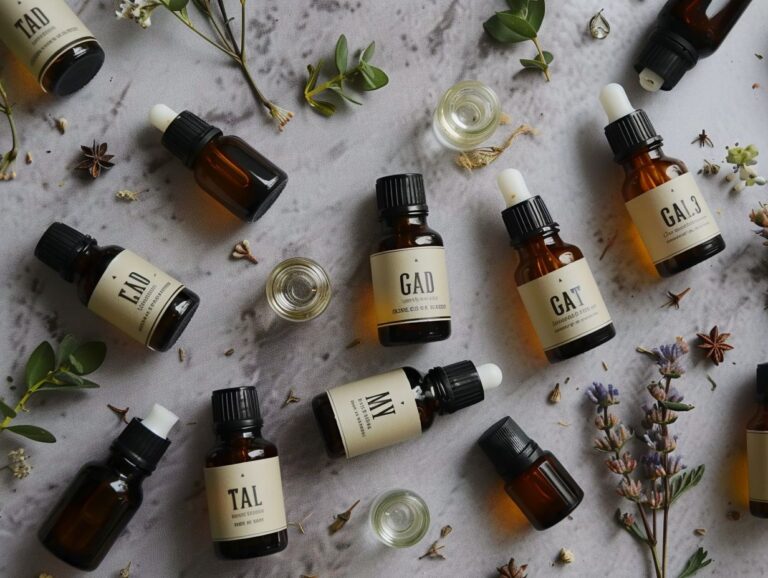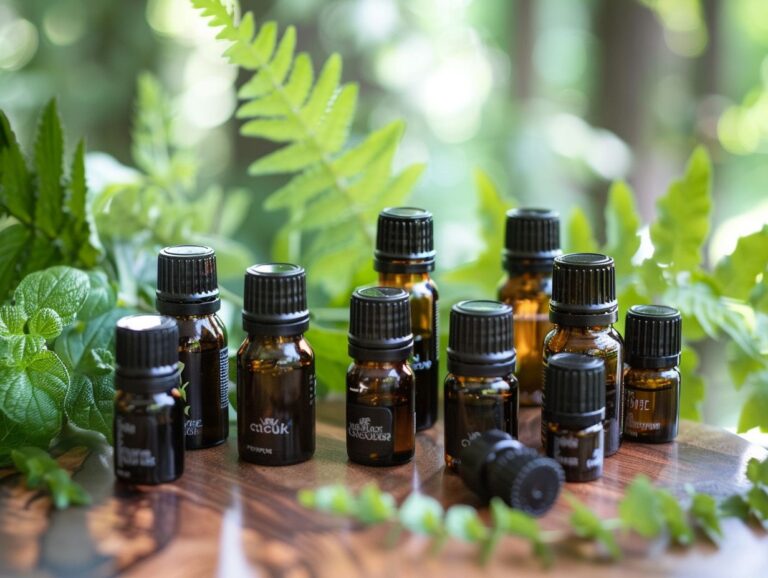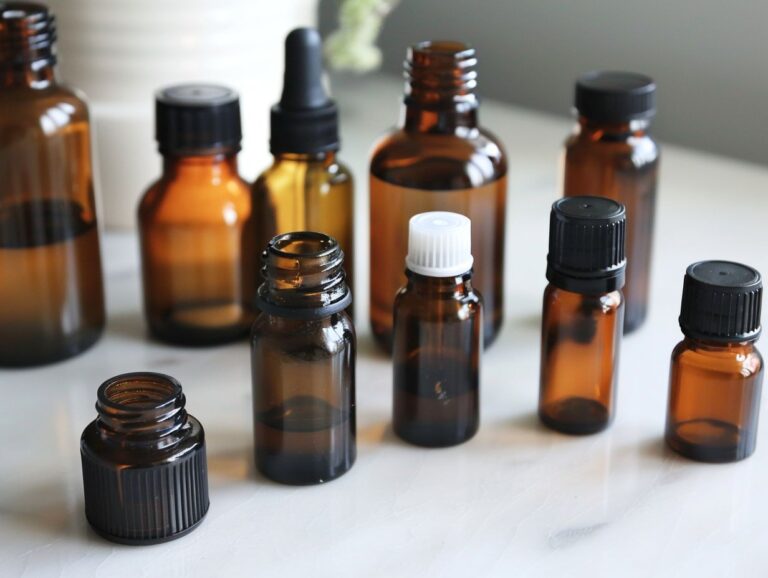Why Are Essential Oils Bad for Your Skin
Essential oils have gained popularity for their natural benefits, but using them on your skin can be a double-edged sword. Are essential oils safe for skin?
We explore the different ways essential oils are used for skin care, the benefits they offer such as natural fragrance and anti-inflammatory properties, and potential risks like irritation and photosensitivity.
Find out which essential oils are harmful for skin and how to safely incorporate them into your skincare routine to maintain skin health.
Key Takeaways:
What Are Essential Oils?
Essential oils are highly concentrated liquids extracted from plants that contain aromatic compounds. These oils are popular in skincare due to their natural origins and potential benefits for the skin as recognized by dermatologists.
Extraction Process: The extraction of essential oils involves various methods such as steam distillation, cold pressing, or solvent extraction, depending on the plant material used. Each method ensures the preservation of the oil’s potent properties. For more information on why essential oils can’t be used on skin, you can visit essential oils skin usage.
Diverse Uses: Essential oils are versatile and find applications in aromatherapy, skincare, hair care, and even household cleaning products. They are known for their soothing, purifying, and rejuvenating effects on the skin.
Expert Opinions: Dermatologists often recommend certain essential oils, like lavender or tea tree oil, for their antibacterial, anti-inflammatory, and antioxidant properties that can benefit the skin without causing irritation.
How Are Essential Oils Used for Skin Care?
Essential oils are used in various skincare products to address different skin concerns and enhance the effectiveness of skincare routines. These oils are incorporated into formulations to provide targeted benefits for the skin.
For example,
- lavender oil is often included in products aimed at soothing sensitive skin or combating inflammation due to its calming properties.
- On the other hand, tea tree oil may be found in skincare solutions targeting acne-prone skin, as it possesses natural antibacterial and anti-inflammatory qualities.
- The integration of rosehip oil in anti-aging formulations is common, given its high vitamin C content, promoting collagen synthesis and skin rejuvenation.
What Are the Different Ways to Use Essential Oils on Skin?
Essential oils can be used on the skin through various application methods such as dilution in carrier oils for massages, incorporation into skincare products like serums and moisturizers, and diffusion in a diffuser for aromatherapy purposes.
When diluting essential oils in carrier oils for massages, it’s crucial to follow recommended guidelines to ensure the safety and effectiveness of the application.
Dilution ratios vary depending on the type of essential oil and the sensitivity of the individual’s skin. Always perform a patch test before widespread application to check for any adverse reactions. For incorporating essential oils into skincare products, consult with a skincare professional for appropriate dilution percentages and application methods. When using a diffuser for aromatherapy, make sure the space is well-ventilated and that the essential oils are diffused for short periods to prevent overexposure.
What Are the Benefits of Using Essential Oils on Skin?
Using essential oils on the skin can offer a range of benefits, including providing a natural fragrance, anti-inflammatory properties, and antioxidant effects that contribute to skin health and overall well-being.
These oils, derived from plants and known for their aromatic properties, not only add a delightful scent to skincare products but also hold numerous therapeutic advantages.
Essential oils such as lavender and tea tree are renowned for their anti-inflammatory qualities, soothing irritated skin and reducing redness. Their antioxidant properties help combat free radicals, minimizing signs of aging and promoting a youthful complexion. Incorporating these oils into your skincare routine can help nourish and protect your skin naturally.
Natural Fragrance
One of the key benefits of using essential oils on the skin is their ability to provide a natural and aromatic fragrance that enhances the sensory experience of skincare routines.
Essential oils are not only known for their pleasant scents but also for their potential therapeutic effects on the mind and body. The rich, aromatic qualities of essential oils can elevate the olfactory experience during skincare rituals, creating a multisensory journey that promotes relaxation and well-being.
When incorporated into skincare products, these natural fragrances not only add a delightful scent but also contribute to the overall efficacy of the regimen. The essence of natural fragrances can evoke different emotions and memories, transforming a daily skincare routine into a luxurious self-care experience.
Anti-inflammatory Properties
Essential oils exhibit anti-inflammatory properties that can help soothe skin irritation, redness, and inflammation, making them valuable additions to skincare formulations for calming sensitive skin.
Regarding addressing skin issues, the anti-inflammatory benefits of essential oils play a crucial role in promoting skin health. By reducing inflammation, these oils can assist in maintaining a balanced complexion and preventing flare-ups of conditions like eczema or psoriasis. The soothing effects of essential oils can provide relief to individuals with sensitive skin prone to redness and discomfort. Incorporating these natural remedies into a skincare routine can contribute to a more calm and nourished complexion, offering a holistic approach to managing skin concerns.
Antioxidant Effects

Antioxidants, such as those found in essential oils, provide vital defense mechanisms against the harmful effects of free radicals, which can cause cellular damage and lead to premature aging of the skin. By neutralizing these free radicals, antioxidants help in maintaining the skin’s resilience, reducing inflammation, and promoting a youthful appearance.
The powerful antioxidant properties of essential oils make them a popular choice in skincare products, as they not only combat oxidative stress but also support the skin’s natural regeneration processes. Regular use of antioxidant-rich essential oils can help in maintaining skin vitality and radiance.
What Are the Risks of Using Essential Oils on Skin?
While essential oils offer numerous benefits, there are risks associated with their use on the skin, including the potential for irritation, allergic reactions, and sensitization, underscoring the importance of essential oil safety.
Essential oils, being highly concentrated plant extracts, can lead to adverse skin reactions if not used properly. Skin irritation, characterized by redness, itching, or burning sensation, is a common issue that may arise, especially in individuals with sensitive skin. Some essential oils, such as citrus oils, can increase skin photosensitivity, making the skin more prone to sun damage. Allergic responses, like rashes or hives, can occur due to individual sensitivity to specific compounds in essential oils.
Irritation and Allergic Reactions
Using essential oils on the skin can sometimes lead to irritation, redness, itching, swelling, and allergic reactions in individuals with sensitive skin or allergies, highlighting the importance of conducting patch tests and monitoring skin responses.
It’s crucial to pay attention to any signs of skin irritation that may occur after applying essential oils for skin. Symptoms of skin reactions can range from mild itching and redness to more severe swelling and rashes. Allergic reactions may manifest as hives, eczema flares, or even blistering.
Patch testing, where a small amount of diluted oil is applied to a small area of skin and observed for 24 hours, is a recommended method to assess potential sensitivity. For those with consistently reactive skin, it’s advised to consult a dermatologist before using essential oils extensively.
Photosensitivity
Certain essential oils can cause photosensitivity, making the skin more prone to sun damage and UV-related issues, necessitating caution when using photosensitive oils and ensuring adequate sun protection measures.
Photosensitivity is a reaction where the skin becomes more sensitive to sunlight, resulting in increased risk of sunburn and other skin damage.
- Bergamot oil,
- lemon oil, and
- grapefruit oil
are among the essential oils known to trigger photosensitive reactions when applied to the skin.
To reduce the risk of photosensitivity, it’s essential to apply photosensitive oils diluted on the skin and avoid sun exposure for at least 12 hours after application.
Interaction with Medications
Essential oils may interact with certain medications or skincare ingredients, potentially leading to adverse effects or reduced efficacy of treatments, emphasizing the importance of consulting healthcare professionals before incorporating new products.
While essential oils are known for their aromatic and therapeutic properties, they contain powerful compounds that can have varying effects when combined with medications or skincare products. Some essential oils, such as citrus oils, may increase skin sensitivity, leading to irritation when used with certain topical treatments.
It is crucial to understand that essential oils can penetrate the skin and interact with medications, affecting their absorption or metabolism. This makes it imperative for individuals to disclose their skincare routine and medication regimen to healthcare providers to avoid potential adverse reactions or reduced treatment effectiveness.
Skin Sensitization
Prolonged or improper use of essential oils can lead to skin sensitization, particularly in individuals with acne-prone or sensitive skin, necessitating caution, monitoring, and adherence to safe application guidelines.
When essential oils are used incorrectly, they can disrupt the skin’s delicate balance, triggering adverse reactions like irritation, redness, or inflammation. Skin sensitization is a process where repeated exposure to a substance can lead to the development of allergic contact dermatitis over time. It’s crucial to recognize that certain essential oils, such as citrus oils or those high in compounds like aldehydes, can be more sensitizing than others. To minimize the risk, individuals with sensitive skin should perform a patch test before full application and dilute essential oils with a carrier oil before use.
Which Essential Oils Are Harmful for Skin?
Certain essential oils, such as citrus oils, eucalyptus oil, cinnamon oil, and peppermint oil, can be harmful to the skin due to their potential irritants or sensitizing properties, warranting caution in their application.
These oils contain compounds that may lead to skin reactions, ranging from mild irritation to allergic responses. Citrus oils, like lemon or lime, are phototoxic, making the skin more sensitive to sunlight, increasing the risk of burns or discoloration when exposed to UV rays. Eucalyptus oil is known for its strong aroma, but it can cause skin irritation, especially when used undiluted. Cinnamon oil, with its warming effect, can cause redness, itching, or even burning sensations on the skin if not properly diluted.
Citrus Oils

Citrus oils, such as lemon verbena and lemongrass, can be harmful for the skin due to their potential to cause photosensitivity and skin irritation, particularly when exposed to sunlight.
Skin sensitization: Citrus oils contain compounds that can sensitize the skin, making it more prone to irritation or allergic reactions upon contact. This can manifest as redness, itching, or even a burning sensation. To avoid such reactions, it’s crucial to dilute essential oils on skin bad properly before applying them to the skin.
Photosensitive reactions: One of the major risks of using citrus oils on the skin is their phototoxic nature, meaning they can increase the skin’s sensitivity to sunlight. This may lead to severe sunburns, hyperpigmentation, or even blistering. To minimize the chances of photosensitive reactions, it’s recommended to use citrus oils in the evening or avoid sun exposure for at least 12 hours after application.
Eucalyptus Oil
Eucalyptus oil can trigger skin sensitivity and allergic reactions in some individuals, making it important to perform patch tests and avoid direct application on sensitive or compromised skin.
The sensitizing properties of eucalyptus oil are due to its main component, eucalyptol, which can lead to irritation, redness, or even dermatitis when applied undiluted or in high concentrations. People with skin sensitivity or conditions like eczema or psoriasis should be particularly cautious when using products containing eucalyptus oil. To mitigate the risks, it is advisable to dilute the oil with a carrier oil before topical application or opt for products with lower concentrations of eucalyptus oil. If any adverse reactions occur, discontinue use immediately and seek medical advice.
Cinnamon Oil
Cinnamon oil can be a skin irritant, leading to redness, itching, and discomfort, especially for those with sensitive skin or pre-existing skin conditions, highlighting the need for dilution and minimal exposure.
Excessive use of undiluted cinnamon oil on the skin may trigger adverse reactions, such as a burning sensation or rash. It is crucial to perform a patch test before applying it widely. Mixing cinnamon oil with a carrier oil like coconut or almond oil can help reduce its potency, preventing harsh reactions. Properly store cinnamon oil in a cool, dark place to maintain its efficacy while minimizing the risk of skin irritation. If irritation occurs, discontinue use immediately and seek medical advice if symptoms persist.
Peppermint Oil
Peppermint oil can cause skin reactions such as tingling, burning, or redness, particularly when applied undiluted or in high concentrations, underscoring the importance of dilution and careful application.
How bad is essential oil for skin reactions are more common in individuals with sensitive skin, allergies, or those using the oil improperly. Symptoms of sensitivity may include itching, rash, or hives.
To avoid such reactions, it is advisable to dilute peppermint oil with a carrier oil like coconut or almond oil before application. A safe dilution ratio is typically 2-3 drops of peppermint oil per teaspoon of carrier oil. Patch testing on a small area of skin before widespread application can also help identify any potential adverse reactions.
How Can Essential Oils Be Used Safely on Skin?
To ensure the safe use of essential oils on the skin, it is essential to dilute them with carrier oils, conduct patch tests to check for sensitivity, avoid sun exposure after certain applications, and seek guidance from healthcare professionals for personalized recommendations.
When diluting essential oils, a general rule of thumb is to use a carrier oil like jojoba, coconut, or almond oil in a 2-3% dilution ratio to minimize skin irritation. Patch testing involves applying a small amount of diluted oil on a small area of skin and observing for any adverse reactions over 24 hours.
Some essential oils, especially citrus oils, can increase skin sensitivity to UV rays. It’s crucial to apply them at least 12 hours before sun exposure or opt for essential oils that are safe for use in the sun.
Consulting a healthcare professional or an aromatherapist can provide personalized advice on the most suitable essential oils for your specific needs and health conditions, ensuring a safe and effective skincare routine.
Diluting with Carrier Oils
Diluting essential oils with carrier oils like jojoba oil is a common and effective method to reduce the risk of skin irritation and ensure proper absorption of the oils without compromising their benefits.
Choosing a suitable carrier oil is crucial for diluting essential oils effectively. Jojoba oil is a popular choice due to its long shelf life, stability, and skin-nourishing properties. Other excellent carrier oils include sweet almond oil, coconut oil, and grapeseed oil. When diluting essential oils, it’s important to follow proper ratios to maintain efficacy and safety. A typical dilution ratio is 2-3 drops of essential oil per teaspoon of carrier oil for general use, but this can vary depending on the specific essential oil and intended application.
Patch Testing
Conducting a patch test before applying essential oils to larger skin areas is crucial to identify potential sensitivities or adverse reactions, involving applying a diluted oil to a small skin patch and monitoring for any negative responses.
This method is especially important for individuals with sensitive skin, as it can help prevent allergic reactions or irritations. Essential oils bad for you is a simple yet effective way to assess how your skin may react to a particular essential oil before full application.
To conduct a patch test, first, choose a small, inconspicuous area on your skin, such as the inner forearm, and apply a diluted solution of the oil using a cotton swab or cotton ball. Next, cover the area with a bandage or adhesive patch to keep the oil in place for 24 hours. During this time, observe for any redness, itching, swelling, or other signs of skin irritation. Learn more about why essential oils are bad for your skin.
If you experience any adverse reactions, immediately remove the patch and wash the area with mild soap and water. It is recommended to wait at least 48 hours before using the essential oil on a larger skin area to ensure your skin does not react negatively.
Avoiding Sun Exposure

Photosensitivity refers to the increased skin reaction to sunlight, which can lead to severe burns, rashes, or discoloration when photosensitive oils are used. Essential oils such as bergamot, lemon, grapefruit, and lime are known for their photosensitive properties.
To protect your skin, it is advisable to apply these oils in the evening or when you know you will not be exposed to the sun for several hours. Using sunscreen with a high SPF, wearing protective clothing like hats and sunglasses, and seeking shade during peak sun hours are essential precautions to minimize the risks of adverse sun reactions.
Consulting a Healthcare Professional
When incorporating essential oils into skincare routines, consulting a healthcare professional, such as a dermatologist or skincare expert, can provide personalized advice on suitable oils, application methods, and potential interactions with existing skincare products.
Professional guidance ensures that essential oils are used effectively and safely in skincare regimens, helping individuals address specific skin concerns without causing harm or irritation. Expert recommendations can prevent adverse reactions and guide users towards achieving optimal results with their chosen oils. By integrating essential oils safely based on expert advice, individuals can enhance the effectiveness of their skincare routines and maintain healthy, glowing skin in the long run.
Frequently Asked Questions
Why Are Essential Oils Bad for Your Skin?
Essential oils have become increasingly popular in skincare routines, but there are concerns about their potential negative effects on the skin. Here are some frequently asked questions about why essential oils may not be the best option for your skin.
How do essential oils affect the skin?
Essential oils are highly concentrated plant extracts that contain powerful chemicals. These chemicals can irritate the skin and potentially cause allergic reactions or sensitization. They can also disrupt the skin’s natural balance and lead to dryness, redness, and other skin issues.
Can essential oils clog pores?
Yes, some essential oils have a thick consistency that can clog pores when applied directly to the skin. This can lead to breakouts and acne. It’s important to dilute essential oils properly and patch test before using them on the face.
Do essential oils have any benefits for the skin?
While essential oils may have some benefits for the skin, such as anti-inflammatory or antimicrobial properties, these benefits are not proven and may not outweigh the potential negative effects. It’s best to consult with a dermatologist before using essential oils on the skin.
Which essential oils are the most irritating for the skin?
Some essential oils are more likely to cause irritation than others. Examples include peppermint, lemon, and tea tree oil. It’s important to research and understand the potential risks of using each essential oil before incorporating it into your skincare routine.
Are there any alternative options to using essential oils for skincare?
Yes, there are many alternative options for incorporating natural ingredients into your skincare routine without the potential risks of using essential oils. Some examples include honey, aloe vera, and coconut oil. It’s always best to consult with a dermatologist for personalized skincare recommendations.
Should essential oils be avoided completely in skincare?
Not necessarily. While essential oils may not be the best option for everyone’s skin, some individuals may benefit from using them in moderation and with proper dilution. It’s important to listen to your skin and discontinue use if any irritation occurs.








One Comment